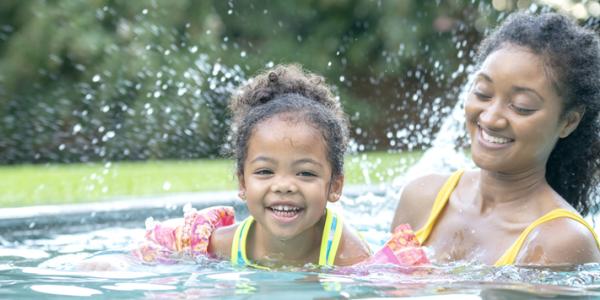
Swimming is the most popular summer activity, but can often be risky. This summer, there are even more risks to be aware of.
According to the CDC, there is no evidence that COVID-19 can spread to people through water.
To ensure further safety, there are actions you can take to reduce your risk of getting or spreading the virus when you go to public swim areas, such as beaches, pools, water playgrounds, and hot tubs.
- Stay home if you are sick.
- Check to see if the public swim area, pool, water playground, or hot tub has steps in place to prevent the spread of the virus.
- Stay at least 6 feet away, both in and out of the water, from people you don’t live with. Avoid crowded swim areas, beaches, pools, water playgrounds, and hot tubs where you cannot stay 6 feet away from others.
- Wear a cloth face covering when you are not in the water.
- Wash your hands often and don’t share items with people you don’t live with.
Follow these safety tips whenever you are in, on or around water.
Make Water Safety Your Priority
- Swim in designated areas supervised by lifeguards.
- Always swim with a buddy; do not allow anyone to swim alone. Even at a public pool or a lifeguarded beach, use the buddy system!
- Ensure that everyone in the family learns to swim well. Enroll in age-appropriate water orientation and learn-to-swim courses.
- Never leave a young child unattended near water and do not trust a child’s life to another child; teach children to always ask permission to go near water.
- Have young children or inexperienced swimmers wear U.S. Coast Guard-approved life jackets around water, but do not rely on life jackets alone.
- Establish rules for your family and enforce them without fail. For example, set limits based on each person’s ability, do not let anyone play around drains and suction fittings, and do not allow swimmers to have breath-holding contests.
- Even if you do not plan on swimming, be cautious around natural bodies of water including ocean shoreline, rivers and lakes. Cold temperatures, currents and underwater hazards can make a fall into these bodies of water dangerous.
- If you go boating, wear a life jacket! Most boating fatalities occur from drowning.
- Avoid alcohol use. Alcohol impairs judgment, balance and coordination; affects swimming and diving skills; and reduces the body’s ability to stay warm.
Prevent Unsupervised Access to the Water
- Install and use barriers around your home pool or hot tub. Safety covers and pool alarms should be added as additional layers of protection.
- Ensure that pool barriers enclose the entire pool area, are at least 4-feet high with gates that are self-closing, self-latching and open outward, and away from the pool. The latch should be high enough to be out of a small child’s reach.
- If you have an above-ground or inflatable pool, remove access ladders and secure the safety cover whenever the pool is not in use.
- Remove any structures that provide access to the pool, such as outdoor furniture, climbable trees, decorative walls and playground equipment.
- Keep toys that are not in use away from the pool and out of sight. Toys can attract young children to the pool.
Maintain Constant Supervision
- Actively supervise kids whenever around the water—even if lifeguards are present. Do not just drop your kids off at the public pool or leave them at the beach—designate a responsible adult to supervise.
- Always stay within arm’s reach of young children and avoid distractions when supervising children around water.
Know What to Do in an Emergency.
- If a child is missing, check the water first. Seconds count in preventing death or disability.
- Know how and when to call 9-1-1.
- If you own a home pool or hot tub, have appropriate equipment, such as reaching or throwing equipment, a cell phone, life jackets and a first aid kit.
This article first appeared in the July 2017 edition of the HealthPerks newsletter and was updated in July 2020.

